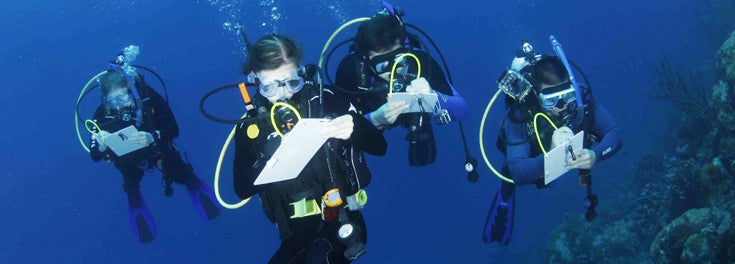
Conducting scientific research can be challenging enough without also having to do it while submerged under water. But at URI, students can receive training in nearly every possible level of scuba diving, including scientific diving, enabling them to get hands-on experience learning about everything from coral reefs and ancient shipwrecks to marine algae and aquaculture.
Kristian Dzilenski ’14, for instance, earned six different scuba certifications at URI while studying marine affairs and aquaculture. It allowed him to enroll in a J-term class on marine conservation in Bonaire and participate in a research project on lionfish in the British Virgin Islands. “I’ve really come to love diving and want to teach others so they may partake in and perhaps help protect our marine resources,” said Kristian.
One thing that’s beautiful about scientific diving is that it’s completely open-ended. Whatever you want to do under water, whatever you need to achieve your objective, we can help you do it.
URI Diving Safety Officer Anya Hanson said she and her colleagues provide the training to any student who needs to go under water, regardless of the project. She regularly trains students seeking to participate in a wide range of marine biology research, as well as those enrolling in the University’s underwater archaeology field schools in Bermuda and Israel. And last year she provided scientific dive training to student members of the Narragansett Indian tribe in a research project to find ancient artifacts from their ancestors.
“Scientific diving is about gathering observations and data under water,” said Hanson. “While termed ‘scientific diving,’ it is applicable to any research, educational or outreach activity. If we have students who want to do underwater art or film, our Research Diving Methods course covers those topics.”
The course involves 100 hours of work in the classroom, the pool and in Narragansett Bay. It covers everything needed to work under water, including basic diving physics, rescue topics and first aid, as well as specific methods of conducting underwater research. “We’re teaching people how to work in a foreign environment and focused on their safety,” Hanson said.
Graduate student Rebecca Flynn became a certified scientific diver to conduct research on how boat anchors damage coral reefs. She dived at more than 25 reef sites in the Virgin Islands, measuring corals and recording evidence of anchor damage. And she learned a great deal about herself along the way. “The most useful thing I learned was that I can stay calm under pressure by just trusting in my training and remaining present,” Rebecca said. “And I gained an even deeper love of the ocean and working under water.”
The dive training that Russell Dauksis ’13 received as an undergraduate not only allowed him to participate in three Caribbean research projects and an internship in Puerto Rico, but it opened doors for him after graduation, too. “Now I’m fortunate enough to get paid as a scuba diving research assistant where we collect fish at a nuclear power plant’s artificial reef mitigation effort,” he said. “Diving as a job is the best employment I could ever ask for.”
“One thing that’s beautiful about scientific diving is that it’s completely open-ended,” concluded Hanson. “Whatever you want to do under water, whatever you need to achieve your objective, we can help you do it.”
